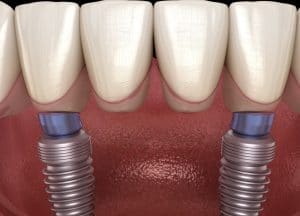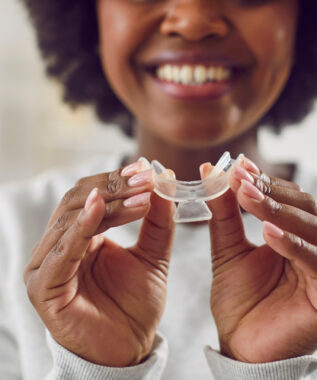 The appearance of your smile is the first thing that people can notice about your tooth loss. However, there’s much more going on with your oral health that others won’t be able to notice, and even you may not realize until long after you’ve lost teeth. These effects, such as the way your jawbone reacts the loss of your teeth roots and how your other teeth respond to the empty space in their ranks, can lead to many more complications with your oral health. The best way to restore your smile is to replace as much of your lost tooth structure as possible. That includes the root that supported the visible crown of your tooth, and used to rest securely within your jawbone structure.
The appearance of your smile is the first thing that people can notice about your tooth loss. However, there’s much more going on with your oral health that others won’t be able to notice, and even you may not realize until long after you’ve lost teeth. These effects, such as the way your jawbone reacts the loss of your teeth roots and how your other teeth respond to the empty space in their ranks, can lead to many more complications with your oral health. The best way to restore your smile is to replace as much of your lost tooth structure as possible. That includes the root that supported the visible crown of your tooth, and used to rest securely within your jawbone structure.
They make sure replacement teeth stay still
Not all replacement teeth come with root-like supportive anchors to keep them in place. In fact, dental implant posts are a relatively new addition to the world of restorative dentistry. More traditional dental bridges and dentures rely on other solutions for support, such as dental crowns attached to nearby teeth, or clasps and adhesives for partial or full dentures. This is one reason why traditional replacement teeth can sometimes lose their grip, becoming loose and shifting along the dental ridge when you try to bite and chew your food.
They can also support the foundation of your smile
Dental implants are unique in their ability to replace your lost teeth roots, and this alone gives them several important capabilities that more traditional options can’t offer. That includes stimulating the jawbone structure that the implant posts are placed in, which is vital function of your healthy, natural teeth roots. This stimulation tells the body to send your jawbone ample minerals and nutrients. When it’s diminished because a tooth root is missing, your jawbone receives fewer minerals and nutrients, which cause it to shrink over time. With dental implants, your replacement teeth will restore your smile and bite function as well as the support that healthy, natural teeth roots are meant to provide your jawbone structure.
They actually lower your risks of losing more teeth
The long-term effect of diminished stimulation and resulting jawbone erosion can significantly impact your oral health. For example, as your jawbone grows weaker and smaller, your risks of losing more teeth get higher and higher. This is due the lack of support that a weakened jawbone offers, which can only be restored with the help of dental implant posts. By replacing your lost teeth roots and their functions, dental implants help significantly lower your risks of losing more teeth in the near future.
Restore your smile better with dental implants
Dental implants give your smile much-needed support and restoration after you’ve experienced tooth loss. To learn more, schedule an appointment with us by calling Dreem Dentistry in Leawood, KS, today at 913-681-5500. We also serve patients who live in Overland Park and all surrounding communities.






